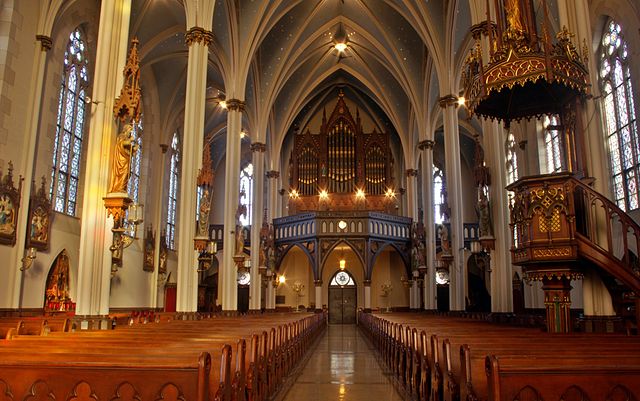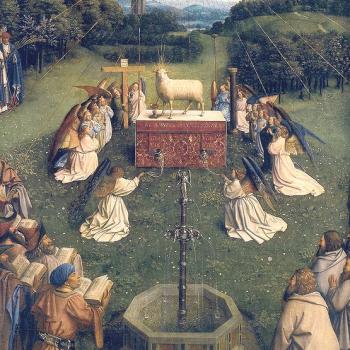St. Joseph church, Detroit: my home parish since March 1991: German Gothic revival style (1870s) [Wikimedia Commons / Creative Commons Attribution-Share Alike 3.0 Unported license]
(mid-1990s)
* * * * *
Nona the Non-Denominational Protestant: I don’t get it, Peter, why Catholics keep putting up with the same old empty form prayers and rituals every Sunday at Mass. Don’t you ever have the desire to grow in the Lord, and feel God’s presence and praise Him exuberantly?
Peter the “Papist”: How do you know that all Catholics don’t “feel” anything, or desire to grow? That seems pretty judgmental to me. Sure, many Catholics are nominal and spiritually cold, but we don’t have a monopoly on that characteristic, not by a long shot!
Nona: I can say that because the Mass is just vain repetition, which Jesus condemned in Matthew 6:7. Since it isn’t spontaneous, it can’t be from the Holy Spirit, but merely a dead tradition of men. It’s not alive and spiritual, like our service. We’re on fire.
Peter: I think that you make a lot of unwarranted conclusions. First of all, repetition in and of itself isn’t always a bad thing. You overlook the fact that Jesus says vain repetition. Vain (Gk., battalogeo in Matthew 6:7) means “to repeat idly, or “meaningless and mechanically-repeated phrases,” as in pagan (not Jewish) modes of prayer. So the Lord is condemning prayers uttered without the proper reverence or respect for God. As usual, He is concerned with the inner dispositions of the worshiper (see, for example, Isaiah 1:11-15, Matthew 7:20-23, 15:9), not with outward appearance, as you seem to emphasize. God sees the heart. Besides, if repetition itself were wrong, Protestants are as guilty of it as we are. Lutherans, Anglicans and Methodists are just as liturgical as Catholics, with Presbyterians not far behind. All have form prayers and creeds, such as the Nicene Creed, which are repeated every Sunday. Even the Baptists have a set routine they stick to.
Nona: Don’t lump me in with them; I’m a non-denominational Christian. I’m not a “Protestant.” That’s just a label and tradition of men. I go by the Bible alone.
Peter: Evangelical Protestants are always saying that they’re merely following the Bible’s clear teaching, but that’s a whole ‘nother subject. Anyway, pentecostal, charismatic, “Spirit-filled” services are just as repetitious as more liturgical, ordered churches. Your position amounts to a plain old prejudice against written, traditional prayer. This proves too much, since the Lord’s Prayer, and many of the Psalms would become vain repetition as well; for example, in Psalm 136, the same exact phrase is repeated for 26 straight verses! Since Scripture is “God-breathed,” if you’re correct this would mean that God Himself indulged in the very practice which He condemns elsewhere.
Nona: Well, I guess you’ve got a point there, but I still say that our services are more on fire since they’re led by the spontaneous leading of the Spirit.
Peter: Having participated in both types of worship, I can tell you that your services — edifying as they may be — have just as much form and repetition, consciously or not, as anyone’s. The music and prayer portions always seem to last the same amount of time, and then comes prophecy, the collection, a 45-minute sermon, and so on. The praises almost invariably are “Praise you Jesus,” “Hallelujah,” “Glory to you Lord,” over and over. The prophecies vary little. I heard a “prophecy” on two occasions at my church where a person blurted out, “I am the alfalfa and the Omega” (see Revelation 1:8,11)* [laughs]. If Catholic worship is supposedly so “dead,” I could say that informal worship can be excessively emotional and sometimes downright silly — not always “spiritual.” No Christian group is above criticism, or unable to benefit from others in many ways.
[* Actual experience of the author, who was a “non-denominational,” charismatic evangelical Protestant.]
Nona: You know, I’ve never thought about all this in the way you have. But I’ve been on both sides, too. When I was Catholic, I used to get so bored at Mass. I wasn’t convicted or challenged. It was so dry and meaningless, and the homilies left much to be desired. I never heard the gospel till I got saved 12 years ago.
Peter: I don’t know how you could never get challenged or not hear the gospel. At every Mass there are four lengthy Bible readings from the Old Testament, the Psalms, the Gospels, and the Epistles — far more than at Protestant services. Sure, the homilies aren’t generally as interesting and “meaty” (in a certain sense) as Protestant ones. I admit that you guys win hands down today when it comes to fiery, stirring oratory, but as an adult, you can easily read all the theology and sermons you want. The potential for learning is unlimited. For example, if you want great preaching and food for thought from Catholics, I suggest you read the sermons of St. Augustine, or St. John Chrysostom, or John Henry Newman. Evangelicals love to read Scripture; they could benefit by reading the works of great Christians of the past also. There is a long, fabulous Christian heritage just waiting to be discovered by each Christian.
Nona: Perhaps you’re right about that, but isn’t the purpose of going to church to get fed and to gear up for the following week, with all its problems and stress? I need to be exhorted and encouraged.
Peter: Those aspects are valid, but I would say with all due respect, that being “fed” is for spiritual babes (1 Corinthians 3:1-2, Hebrews 5:12-14). The rest of us can feed ourselves. The Mass requires some work and active participation, as Vatican II stresses. The word liturgy means work of the people. The informed, committed Catholic doesn’t go to church primarily to “feel good,” “get fed,” or to “get moral support,” but to engage in the work of worshiping God with his whole being, including the mind (Luke 10:27), and to receive Him in communion. Even if one doesn’t “feel” anything, it is worthwhile to be obedient to God and worship Him simply for Who he is.
Nona: I-um . . . maybe I’ve been too harsh on Catholics, and judgmental. I suppose Mass wasn’t all bad all the time. Perhaps I was uninformed and lax, and didn’t make enough effort to learn its true meaning.
Peter: You know, Nona, there are charismatic Masses which combine both traditional and contemporary worship, kind of “the best of both worlds.” They’re usually a little more spontaneous, and have more lively worship singing (I admit, Catholics generally sing terribly or not at all!). Yet, the structure of the Mass and liturgy is respected and not violated. You might like the homilies a little better, too.
Nona: I have to admit you’ve really challenged me to examine some of my positions. I’ll have to think about this some more. Thanks, and let’s discuss this again.
***













